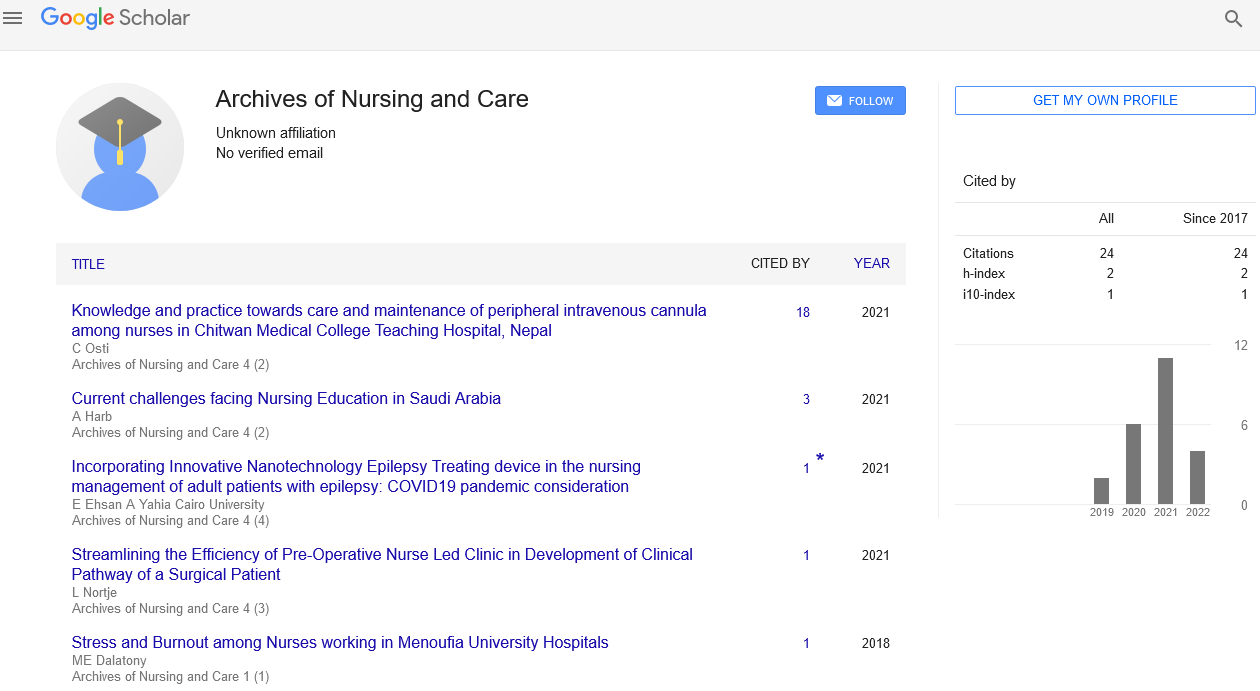Mini Review - Archives of Nursing and Care (2023) Volume 6, Issue 2
Oncology nursing on oncology nurse education and practise
Assad Khan*
Johns Hopkins School of Nursing, US
Johns Hopkins School of Nursing, US
E-mail: khanassad@rediff.com
Received: 03-Apr-2023, Manuscript No. OANC-23-89189; Editor assigned: 05-Apr-2023, PreQC No. OANC-23- 89189 (PQ); Reviewed: 19-Apr-2023, QC No. OANC-23-89189; Revised: 24-Apr-2023, Manuscript No. OANC-23- 89189 (R); Published: 28-Apr-2023; DOI: 10.37532/oanc.2023.6(2).019- 021
Abstract
Oncology nursing is a highly specialised area of nursing that calls for advanced training and education after initial preparation. In 2015, the developing nation of Rwanda began training oncology nurse specialists. This essay illustrates the program's establishment process. The direction for the preparation of this study came from selected literature and input from knowledgeable oncology nurses. Additionally, the University of Rwanda's oncology nursing curriculum and the websites of organisations dedicated to oncology nursing were examined. When they are properly educated, oncology nurses can play a significant role in the treatment of cancer patients as well as cancer preventive initiatives. Others who seek to create a programme similar to Rwanda's masters in oncology nursing could benefit from Rwanda's expertise.
Keywords
oncology nursing practice • Oncology nursing education
Introduction
A specialist nurse who treats cancer patients is known as an oncology nurse. These nurses need higher levels of certification and cancer clinical experience than the normal baccalaureate nursing school can offer. In order to provide cancer patients with the necessary screenings, preventive measures, symptom management, care to maintain as much normal functioning as possible, and supporting measures at the end of life, oncology nursing care must address a variety of patient demands [1].
Role of oncology nurses
A multidisciplinary team that includes trained nurses is essential to the achievement of effective cancer management. Without the work of nurses, it would be impossible to decrease the incidence of cancer, raise the survival rate, improve palliative care, and enhance patient quality of life. Oncology nurses use early detection programmes, provide treatments, and foresee difficulties and exhibit leadership qualities and network within the therapeutic setting. These cancer control efforts are carried out in a variety of clinical settings, including hospital wards, outpatient clinics, primary care offices; homes, palliative care units, and end-of-life (EOL) care facilities. During the decision-making process for cancer therapy, the nurse is crucial. In addition to having a tremendous workload, oncology nurses must provide more complex and sophisticated treatment to sicker patients. Studies have shown that nurses spend more time with patients than other healthcare providers do, and oncology patients stay in oncology facilities for an extended period of time. Nurses are in charge of all forms of care, including end-of-life care [2].
Nursing in Oncology
Being an oncology nurse requires a combination of fortitude and knowledge to deal with cancer every day. The second-leading cause of mortality worldwide, cancer is an unsightly foe. Nurses continue contend with the impacts of cancer on their patients' quality of life and the psychological burden of both diagnosis and treatment, despite efforts for early identification and advancements in therapy having helped improve patient outcomes. At the same time, oncology patients frequently struggle with redefining what a "normal" life is for them while also struggling with physical pain and frequently debilitating exhaustion [3].
The honour of accompanying these patients through the complex mental and physical difficulties brought on by cancer is given to oncology nurses. In addition to assisting with the implementation of the optimal treatment plan for the patient, oncology nurses can support patients with their pain and nausea.
It's likely that you know a little bit about oncology nursing if you're interested in the area. In this post, we'll go over the fundamentals of the position as well as hear first-hand accounts from oncology nurses working in various settings [4].
What does a do nurse in oncology?
Registered nurses with a focus on dealing with cancer patients and those who are in remission are known as oncology nurses. They are well knowledgeable in the pathophysiology, therapies, and pain control of cancer. The duties of an oncology nurse might range from specialised in bone marrow transplantation to emphasising communitybased cancer screening, diagnosis, and prevention [5].
No of where they are employed, oncology nurses typically do the following duties.
Patient assessment: Observing the patient's physical and emotional state, gathering information about their medical history, and evaluating their understanding of their condition and its treatment as well as that of their family members
Patient education: Ensuring that the patient participates in decision-making, comprehends the diagnosis and course of therapy, and is aware of what to do in an emergency
Coordination of care: Maintains phone touch with the patient and their family during the course of therapy, records the care provided, and assists with any referrals required [6].
Direct patient care: This frequently involves giving chemotherapy, but it also entails taking labs, keeping central lines, and giving medication.
Patient symptom management: Identifies the patient's needs and implements remedies to ease weariness, discomfort, nausea, and vomiting
Supportive care: Increases patient comfort and reduces the negative effects of pharmacological treatments.
Discussion
I recall a young oncology nurse who, once, rode in the ambulance with her patient to his house following the end of her shift. She informed me that she believed her presence would help him feel more at ease and facilitate the transition [7].
Patients and oncology nurses develop strong relationships
Oncology nurses are essential in helping patients and carers cope with and overcome disease, frequently developing enduring relationships that persist for years beyond the last treatment. Patients recall nurses who comforted them following a biopsy, took the time to explain therapeutic side effects, and guided them through a challenging operation. Patients are comforted by these nurses after receiving terrible news, victories are shared with them, those who require further aid and support are defended, and contact between the rest of the medical staff and carers is frequently facilitated [8].
Cancer care is coordinated by oncology nurses
Oncology nurses are crucial allies who guide patients through challenging treatment regimens and assist patients manage symptoms and adverse effects. Cancer treatment involves multiple stages, and the patient may consult with numerous specialists from various fields of medicine. Oncology nurses are frequently the ones that offer constant information and direction throughout the treatment regimen. They have the education necessary to evaluate a patient's requirements in both hospitals and outpatient settings. To make sure that patients have sufficient support and professional assistance in their homes and communities, nurses foresee the requirements of patients and family carers and collaborate with case managers and social workers. Because the bond they shared with their nurses was so crucial to their care, many of my patients insisted on scheduling their appointments around their nurses' schedules [9].
Oncology nurses are familiar with their patients and fight for them
I've seen the kindness and compassion of oncology nurses firsthand, and I owe them a tremendous debt of gratitude for enlightening me to the realities of patients' and families' experiences. I've come to value their viewpoint, which frequently combines activism with research.
I take pride in getting to know each of my patients on a personal level, and I frequently begin an appointment by asking them about their lives, their families, and their interests. But I'm always moved when I speak with the oncology nurses who care for those patients and learn that they are far more familiar with a patient than I am! Numerous occasions, nurses have assisted to make observations concerning a patient's situation that might not have been noticed otherwise. My nursing colleagues have gently corrected, commended, humbled, and inspired me as I have developed professionally [10].
Problems and upcoming plans
Like any new academic initiative, there have been difficulties. One of them is the students' limited budgets. Some students manage to balance the demands of their work and study lives by self-sponsoring them while also continuing to work at their respective jobs. Lack of scholarship options for academics to pursue PhD degrees is another issue. As a result, the faculty's financial ability to carry out clinical research is still constrained. Lack of scholarship options for internships or placements abroad to gain experience in fields not common in our settings is another obstacle (e.g., bone marrow and stem cell transplantation).
Oncology nurses will continue to be trained at the national and international levels in the future, and healthcare practitioners will get ongoing professional development in healthcare settings. We anticipate that the academic personnel in Rwanda will receive higher-level training and that more studies on cancer will be done, published in recognised journals, and presented at academic conferences. Initiating exchange programmes between Rwandan oncology nurses and other oncology nurses throughout the world is another goal of ours.
Conclusion
To train specialists in the care of cancer patients, a master's programme in oncology nursing was established in Rwanda. Other nations who want to go in the same way might benefit from our experience. If they have the necessary educational background, oncology nurses can play a significant role in the treatment of cancer patients as well as in cancer prevention initiatives.
References
- Thompson TP, Brown HN. Turnover of licensed nurses in skilled nursing facilities.Nurs Econ.20, 66–69(2002).
- Kennerly S. Perceived worker autonomy: The foundation for shared governance.J Nurs Adm.30, 611–617(2000).
- O’Hagan J, Persaud D. Creating a culture of accountability in health care.Health Care Manag.28, 124–133(2009).
- Rhoades L, Eisenberger R. Perceived organizational support: A review of the literature.J Appl Psychol.87, 698–714(2002).
- Rhoades L, Eisenberger R, Armeli S. Affective commitment to the organization: The contribution of perceived organizational support.J Appl Psychol. 86, 825–836(2001).
- Kennerly SM, Yap TL, Hemmings A et al. Development and psychometric testing of the nursing culture assessment tool.Clin Nurs Res. 21, 467–485(2012).
- Yap TL, Kennerly SM, Flint EP. Nursing culture assessment tool (NCAT): Empirical validation for use in long-term care .Int J Nurs Sci. 25, 241–249(2014).
- Rafferty AM, Ball J, Aiken LH. Are teamwork and professional autonomy compatible, and do they result in improved hospital care?Qual Health Care. 10, 32–37(2001).
- Yap TL, Kennerly SM, Kim J et al.Interdisciplinary Mobility Team Approach to Reduction of Facility-Acquired Pressure Ulcers (Rwjf Grant #66636), Clinicaltrials.Gov Identifier Nct01008254 .Princeton, 15, 26-35(2009).
- Anderson RA, Bailey D.Are teamwork and professional autonomy compatible, and do they result in improved hospital care. Qual Health Care. 64, 256-265(2012).
Indexed at, Google Scholar, Crossref
Indexed at, Google Scholar, Crossref
Indexed at, Google Scholar, Crossref
Indexed at, Google Scholar, Crossref
Indexed at, Google Scholar, Crossref
Indexed at, Google Scholar, Crossref
Indexed at, Google Scholar, Crossref

